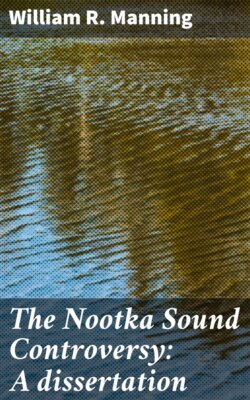Читать книгу The Nootka Sound Controversy: A dissertation - William R. Manning - Страница 4
На сайте Литреса книга снята с продажи.
Chapter I.
INTRODUCTION.
ОглавлениеTable of Contents
Nootka Sound is a small inlet on the western shore of Vancouver Island. It was christened and made known to the world by Captain Cook in 1778. A few years afterwards a flourishing fur trade sprang up between the Northwest Coast and China. Nootka became the center of this trade, though it remained for several years without any settlement except an Indian village. On account of its sudden and growing importance, the Russians, English, and Spaniards all laid plans for occupying the port. It happened that all planned to carry out the project in the year 1789, a year that meant so much for the subsequent history of the world. Though the Nootka incident can make no claim to rank in importance with the great events of that year, yet it was destined to have an influence on the movements then started and to be influenced in turn by them.
The Russian plans were not acted upon, but the plans of the other two were. An English expedition from India and a Spanish from Mexico each sailed in the spring of 1789 to establish a colony at Nootka. The promoters of neither knew anything of the other. The Spanish commander arrived first and took possession. Nearly two months later the Englishman came. A quarrel ensued. The Spaniard seized the Englishman, imprisoned him, his officers and crew, and sent them to Mexico as a prize. A consort vessel arrived a few days later and met the same fate. Two other English vessels had been seized earlier. One of them had been released on bond and the other had been confiscated without adjudication.
The Viceroy of Mexico, instead of acting on his own responsibility, reported the matter to the Government at Madrid. The Spanish Court complained to the British that subjects of the latter had violated the territorial sovereignty of the former, and demanded that the offenders be punished to prevent such enterprises in the future. The British Cabinet rejected the Spanish claim to exclusive sovereignty over the territory in question, and suspended all diplomatic relations until Spain should have offered a satisfactory reparation for the insult which His Britannic Majesty felt that his flag had suffered. Each Court refused to grant the demand of the other and stood firmly on the ground originally taken. To support their respective claims, both Governments made the most extensive armaments. Each nation also called upon its allies for assurances of support and entered negotiations for forming new alliances. For a time it seemed that all Europe would be drawn into war over what, on the face of it, appeared to be an insignificant quarrel between two obscure sea captains.
Speaking of the controversy Schoell says that a few huts built on an inhospitable coast and a miserable fortification defended by rocks were sufficient to excite a bloody war between two great European powers and gave birth to a negotiation which for several months absorbed the attention of all of the maritime powers of Europe.[1] Similar statements were made by other writers within a few years after the incident.[2] Most historians who have touched upon it have either treated it from a partisan standpoint or have considered it of too little importance to merit careful inquiry into the facts.[3]
But far from being merely a dispute over a few captured vessels and a comparatively unimportant trading post, it was the decisive conflict between two great colonial principles, of which England and Spain were, respectively, the exponents. Spain still clung to the antiquated notion that the fact of the Pacific Ocean’s having been first seen by a Spaniard gave his Government a right to all of the lands of the continent which were washed by it. This fact, added to the gift of the Pope, was sufficient to convince the Spanish mind that Spain had a valid title to the whole of the western coast of both Americas. On the other hand, England had long been acting on the now universally accepted principle that mere discovery is an insufficient title, and that land anywhere on the globe not controlled by any civilized nation belongs to that nation which first occupies and develops it.
The controversy is of further importance because of the fact that it tested the triple alliance of 1788 between England, Prussia, and the Netherlands. It also afforded the occasion for overthrowing the Bourbon family compact of 1761. It marked the end of Spain’s new brief period of national greatness, which had resulted from the wise reign of Charles III. It was also the beginning of the collapse of Spain’s colonial empire. Duro, one of the leading Spanish historians of the present, says that it inaugurated a period of degradation disgraceful to Spanish history, and began a series of pictures which cause anyone to blush who contemplates them with love for the fatherland.[4]
The settlement of the controversy determined the subsequent position of England and Spain on the Northwest Coast. Later, after the United States had bought the Spanish claim, the Nootka Sound affair became a part of the Oregon controversy. For a time the dispute threatened to change the course of the French Revolution.[5] It menaced the existence, or at least the expansion, of the United States. It promised to substitute English for Spanish influence in Latin America.
